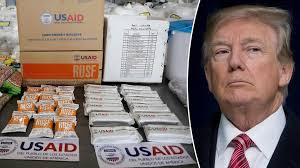The Trump administration has lifted its previous freeze on the distribution of vital HIV medications and reinstated the salaries of nurses supported by U.S. funding.
This development follows a period of heightened anxiety among patients and healthcare providers, who were concerned that the suspension would have dire consequences for HIV treatment access.
The decision to resume aid marks a significant turnaround from the preceding aid suspension, which posed substantial risks to Zimbabwe’s ongoing battle against HIV/AIDS and jeopardized its already vulnerable healthcare framework.
With the easing of restrictions, healthcare facilities can recommence the uninterrupted supply of antiretroviral (ARV) dru_gs, crucial for thousands of patients reliant on these treatments to maintain their health.
A local clinic manager expressed relief upon receiving confirmation of the resumption of ARV distribution, stating, “We will now continue providing antiretrovirals to our patients without interruption. This is a huge relief for everyone involved. Many patients rely on these medicines to stay alive, and the suspension had caused a lot of anxiety.”
The reinstatement of U.S.-funded nurses’ salaries is anticipated to bolster morale among healthcare workers and ensure the continuous provision of essential medical services.
An official from the Ministry of Health emphasized the indispensable role these nurses play in maintaining the integrity of healthcare delivery in Zimbabwe.
“These U.S.-funded nurses are crucial because, without them, there would be significant gaps in the distribution of medicines,” the official remarked. “They are a key part of our healthcare system, and their work directly impacts the lives of thousands of patients.”
The initial suspension had sent shockwaves through the health community, leaving many healthcare workers and patients uncertain about their futures.
“There was a lot of uncertainty and fear,” described an anonymous healthcare worker. “Patients were worried about their treatment, and nurses were concerned about their livelihoods. It was a very difficult time for everyone.”
ALSO READ: Husband who confessed to k!ll!ng & cooking wife, released due to lack of evidence
With the freeze now lifted, a sense of relief has settled over patients and healthcare providers alike. However, it has also sparked dialogue around the sustainability of Zimbabwe’s healthcare framework, with many urging the government to initiate proactive measures to lessen reliance on foreign aid. “One hopes that the Zimbabwean government will not rest on its laurels but instead put an independent plan in place for its people,” the healthcare worker added. “We cannot always depend on external support. We need a long-term solution to ensure the stability of our healthcare system.”
According to a Reuters report, U.S. Secretary of State Marco Rubio granted a waiver for life-saving humanitarian assistance during a 90-day pause in foreign aid. This waiver encompasses essential medicines, medical services, and subsistence assistance but explicitly excludes support related to abortions, family planning conferences, administrative costs, and other non-life-saving activities.
Despite the U.S. being the largest donor of aid globally, contributing $72 billion in fiscal year 2023, recent policy shifts have led to confusion among U.S. lawmakers, aid organizations, and the United Nations. However, the issuance of waivers has provided some clarity surrounding the impact of Trump’s directive. United Nations Secretary.










